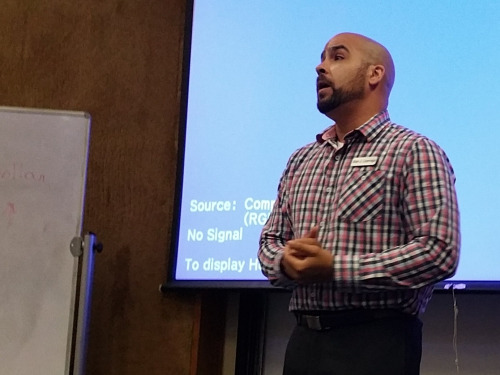Earlier this month, we reported on how progressives and moderates in East Texas who didn’t vote for Trump are “coming out of the woodwork,” creating new grassroots groups and giving local elected officials a headache. This momentum has erupted across the country since November, and nationally, there’s a progressive push for political newbies to run in local elections. Within a week of its launch, nearly 700 people signed up at the new website Run for Something, which aims to demystify the process for people with zero campaign experience.
Here in Tyler, many were intrigued to see a new name on the ballot for the District 5 city council race next month. Alan Lizarraga, 32, a Marine Corp veteran and laboratory supervisor at U.T. Tyler who identifies as a moderate, says the election played a role in his decision to enter politics for the first time. “It charged me up politically,” he says. When he heard the deadline for entering this year’s local races was coming up, he went down to City Hall, saw that his district was up for grabs, and asked how to apply.
To be sure, Lizarraga is an underdog in this fight. His opponent, Bob Westbrook, is a local small business owner with extensive community ties. But as indicated by the heated and feverishly watched Georgia House race earlier this month, where a Democrat has forced a runoff in a deeply red stronghold, local politics is not necessarily business as usual in the age of Trump.
In an interview with the Tyler Morning Telegraph, Westbrook said if elected, he would prioritize education. We checked in on Lizarraga to get a sense of this unexpected candidate’s local bucket list.
Improving city water
It’s been a bad year for the City of Tyler’s water system. In January, the Environmental Protection Agency fined the city for allowing untreated sewage to overflow into waterways, homes, and private yards. The city is required to complete extensive renovations of the municipal water system and pay $563,000, half of which will go to state regulators.
Lizarraga, who has a background in biology, says he wants to prioritize improvements to the city’s water system so this doesn’t happen again. He cites recent concerns about the quality of local drinking water as further reason to put water issues first, preventing additional fines and putting “our minds at ease about drinking our water or property damage from old pipes.”
Access to healthy food
Over the past decade, access to healthy food has become a prominent national issue. Poor Americans have less access to fresh foods than their wealthier counterparts and, in many cases, may fill the gap with fast food. It shouldn’t be hard to believe this is an issue in Tyler, which has 11 Whataburgers, 9 McDonalds, and drive-through lines that snarl traffic every time a new chain opens.
Or, just drive around North Tyler and ask yourself where students at Texas College are supposed to grab a bite after class — not to mention seniors, parents, and anyone else who needs to eat.
While the idea of “food deserts” has received some well-justified criticism in recent years, it’s obvious not all Tylerites live close enough to fresh food options. Lizarraga proposes incentivizing local grocery stores to get healthier food on the shelves in more places, as well as repurposing public land for farmer’s markets and community gardens.
Of course, these are big, complicated propositions, but Tyler’s (slowly, very slowly) growing foodie scene is one indication that there could be broader support for such ideas.
Roads, bike lanes, and sidewalks
Tylerites love their cars, but hate the traffic they cause. In a 2015 city survey, 56 percent of residents said traffic was one of the most important issues facing the city. And, according to recent census data, more than half of those who work in the city spend at least 20 minutes commuting. (There’s no data on how long it takes to drop off and pick up a kid from school, but it certainly seems to take forever.)
He says he’d like to see the city invest in local infrastructure at a rate that is “equitable to our spending for large expansion projects” like the Cumberland Valley shopping center. He would push to prioritize improvements aimed at reducing traffic congestion, like road upgrades and the construction of transit alternatives like bike lanes and sidewalks—proposals which echo the city plan.
Diversifying city leadership
If elected, Lizarraga would be the youngest member of the current city council by five years, and the only educator in the room. Lizarraga says his background in science can help the council find new approaches to challenges facing Tyler. “When you have multiple viewpoints on a matter, you can get the best results. That is something I bring to the table,” he says.
With additional reporting by Chris Groskopf.
Thanks for reading this story. Just one more thing. If you believe in the power of local journalism here in Tyler, I'm hoping that you'll help us take The Loop to the next level.
Our readers have told us what they want to better understand about this place we all call home, from Tyler's north-south divide to our city's changing demographics. Power, leadership, and who gets a seat at the table. How Tyler is growing and changing, and how we can all help it improve. Local arts, culture, entertainment, and food.
We can't do this alone. If you believe in a more informed, more connected, more engaged Tyler, help us tell the stories that need to be told in our community. Get free access to select Loop events, behind-the-scenes updates about the impact and goals of our work, and, above all, a chance to play a part in bringing more fresh, in-depth, unexpected journalism to Tyler.








